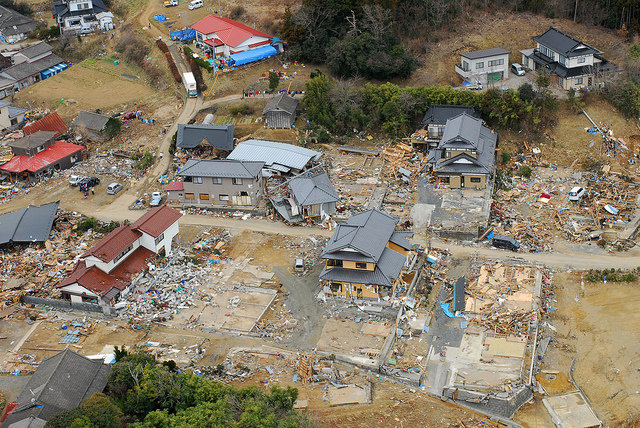
Public and political confidence in Japan’s science system collapsed after the devastating earthquake, tsunami and Fukushima nuclear disaster in March 2011. Tateo Arimoto and Yasushi Sato describe the process of rebuilding trust and reforming Japanese science policy.
Science plays a crucial role in the face of intractable problems, such as global warming, energy shortages, pandemics and large-scale technological accidents. But it is not easy for nations and international organisations to maintain effective systems for scientific advice. Sometimes, scientists can be exposed to political pressures; governments may not be able to identify the right experts; uncertainties accompanying scientific information may not be properly interpreted; and communication between scientists and policy makers can fail in times of crisis.
Such problems were poignantly felt in Japan after the Great East Japan earthquake, tsunami and Fukushima nuclear disaster in March 2011. Many experts appeared in the media and spoke out about evacuation, food safety and other issues, but there was no mechanism to integrate their views for the benefit of the public and policymakers. At the same time, many people lost confidence in the words of scientists who were working closely with the government or the nuclear industry. Public trust in both science and policymaking was severely damaged.
In the three years since these disasters hit Japan, politicians, government officials, prominent scientists, journalists and citizen representatives have had several opportunities to exchange views in a series of symposia on the prospects for scientific advice in Japan. These were organised by institutions such as the Science Council of Japan (SCJ, which is Japan’s national academy of sciences), the Center for Research and Development Strategy (CRDS, a semi-public think-tank) at the Japan Science and Technology Agency, and the National Graduate Institute for Policy Studies(GRIPS, an academic institution). Science advisers from overseas, including Sir John Beddington, the former UK government chief scientific adviser, and Bruce Alberts, the former president of the US National Academy of Sciences, joined those discussions.
In the meantime, the Japanese government began moving forward with reform of the nation’s scientific advisory structure. An expert study group issued a report in December 2011, calling for the appointment of science, technology and innovation advisers for the prime minister and other ministers. This report also called for a strengthening of the secretariat and think-tank functions of scientific advisory bodies, and for closer liaison between the government and the Science Council of Japan.
In March 2012, one year after the cataclysm, CRDS issued a set of proposals for strengthening scientific advice in Japan. These included securing the independence of scientific advisers, ensuring transparency of the scientific advisory process, and proper handling of uncertainty and diversity of scientific views. While similar guidelines already existed in the UK, US and some other nations, CRDS’s guidelines took into consideration Japan’s particular political and cultural context, and factored in a wide range of stakeholders’ views through workshops, symposia and personal exchanges.
The Science Council of Japan also took action. In May 2012, it started discussing how to create new guidelines for scientific advice, taking notice of the principles proposed by CRDS. This resulted in January 2013, in SCJ’s Statement on the Code of Conduct for Scientists, which included clauses on scientific advice and dialogue with society.
More recently, however, Japan’s efforts at reconstructing its scientific advisory system have been losing momentum. The proposal to appoint new science advisers has not been acted upon, partly because of a change of government in Japan. The Council for Science and Technology Policy, the highest policy-making body in this field, has been busy launching new policies to boost innovation and revitalise Japan’s economy, which seems a more urgent priority for Japan under the current administration. Hopefully, the Japanese government and scientific community will soon refocus their attention on issues of scientific advice and the relationships between science and society.
We sit at a crossroads in modern science. A redefinition and reconstruction of science and society relations is an urgent task. And a critical aspect of that is to effectively mediate between science and policymaking. Failure to address these issues will impede wider efforts to rebuild public trust in science, and hold back other innovations to address social challenges.
Meanwhile, international efforts to strengthen scientific advice have accelerated. In April 2013, the Global Science Forum of the Organisation for Economic Co-operation and Development (OECD) established an expert group, co-chaired by the Netherlands, Japan, Germany and Italy, to examine the roles and responsibilities of scientists in policy-making. And in October 2013, the United Nations announced the creation of a Scientific Advisory Board for its Secretary General, with a first meeting taking place in Berlin in January 2014.
Japan has participated in all of these international forums. In particular, in October 2013, Japan hosted a two-day OECD-GSF workshop in Tokyo, attended by representatives from 20 nations. It was agreed in the workshop that, while each nation’s scientific advisory system depends on its historical and cultural contexts, international dialogue is extremely useful and beneficial in building common ground for scientific advice. The OECD Global Science Forum is now aiming to publish its report in early 2015. The result will be discussed at a ministerial meeting, to be held on 20-21 October 2015 in Korea.
As well as discussing what constitutes a sound and effective scientific advisory system, the OECD report will deal with issues as scientific advice in crisis situations, the responsibility and legal liability of scientific advisory bodies and individuals, international collaboration in scientific advice, and the growing involvement of civil society in processes of scientific advice. All of these issues are also on the agenda at the Auckland summit on science advice, taking place this week.
Such developments clearly indicate the international community’s growing commitment to sound and effective scientific advice. This consensus will steadily propel individual nations and international organisations, such as the UN, to further improve that their scientific advisory systems. At the same time, the UN, OECD, the International Council for Science and other bodies should work towards global coordination mechanisms, a “system of systems for scientific advice”. The need for such efforts will continue, as social and environmental challenges demand closer collaboration between scientists and policymakers on a global scale.
Tateo Arimoto is director of the Innovation, Science and Technology Program of the Graduate Institute of Policy Studies, Tokyo. Yasushi Satois a fellow at the Center for Research and Development Strategy in the Japan Science and Technology Agency. They are both participating in this week’s Auckland summit on science advice to governments.
